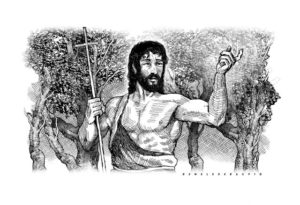
Thomas Merton has a three-part poem, entitled, “St. John Baptist.” The first part speaks of John’s leaving the desert and entering the area of the River Jordan, and how the scribes find his language hard to understand and to accept.
John mentions a Lamb, a Savior (“Whose sandal-latchet / This furious precursor is afraid to loose”). Who could he be, the scribes ask themselves.
Then the poem reminds the scribes of the Lamb’s mercy and patience, which like a flail will separate the wheat (the righteous) from the chaff (the wicked).
Expectedly, the scribes hate the voice of John, whom they find a “terrible and peaceful angel, dressed in skins.”
The second part of the poem consists of a series of questions propounded by Merton to John. Alluding to John as entering the territory of a hostile enemy, the poet asks him whom he met at the guarded outpost.
John replies that the sentries and the blocks (gates of spikes) could not stop him, nor “the abysses of the empty night,” because he “walked in darkness.”
It was as though he was bringing sealed instructions, which he successfully delivered at the appointed meeting, and then left “like the night wind,” without waiting for a compliment or congratulations.
What these lines convey is John’s humility and self-effacement in the presence of Christ.
When asked if all this was just an illusion, John replies that what he did he did for the benefit of his soul more than anything else:
I went into the desert to receive
The keys of my deliverance
From image and from concept and from desire.
I learned not wrath but love,
Waiting in darkness for the secret stranger
Who, like an inward fire,
Would try me in the crucibles of His unconquerable Law.
I consider the poem a faithful, poetic portrayal of the character of John the Baptist as described in the Gospels.
John called on the crowd to change their ways. Luke writes that, when they asked him what they should do, without mincing words, he said, “Whoever has two cloaks should share with the person who has none.
And whoever has food should do likewise.” He told the tax collectors who came to be baptized, “Stop collecting more than what is prescribed.” And the soldiers–“Do not practice extortion, do not falsely accuse anyone, and be satisfied with your wages.”
John’s message is timeless because humankind’s need of grace is endless.
Fittingly, Merton ends his poem to John, whom he calls “the first Cistercian and the greatest Trappist,” with a prayer:
Oh buy us, by your intercession, in your mighty heaven,
Not your great name, St. John, or ministry,
But oh, your solitude and death:
And most of all, gain us your great command of graces,
Making our poor hands also fountains full of life and wonder
Spending, in endless rivers, to the universe,
Christ, in secret, and His Father, and His sanctifying Spirit.